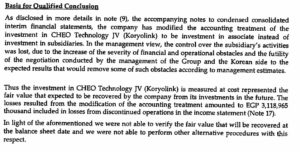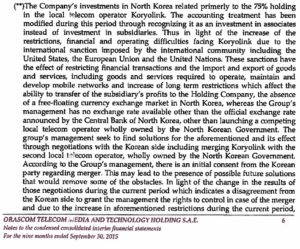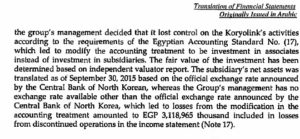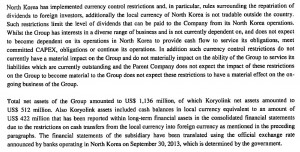Naguib Sawiris is a multi-billionaire telecoms magnate. A truly global citizen, he was born a Coptic Christian in Egypt and educated in Europe. His business empire is controlled from a luxurious tower on the banks of the Nile, yet according to Companies House filings he is usually resident in the the UK, where amongst other things, he runs a hedge fund. As Sawiris confirmed during a recent case before the UK supreme court, he has US citizenship.
He is also deeply involved in global politics: a large donor to Mitt Romney’s failed presidential bid, a power broker in his native Egypt and a regular visitor to Davos. When trouble flared in Cairo after the overthrow of President Morsi, he was the then special envoy to the Middle East Tony Blair’s first port of call. That port being in San Tropez.
Sawiris’s fortune derives from managing the telecoms empire of his family’s business Orascom. Orascom Telecom Holdings was a global telecom player particularly in the developing world.
The company held licences across the globe, from Zimbabwe, Syria, Iraq, Italy and North Korea. When the majority of Orascom Telecom Holdings was sold to Russian telecom giant, Vimplecom in 2011 for $6.6bn, Koryolink, the North Korean cell phone network, was one of the few assets Sawiris held onto.
The North Korean adventure
After building telecoms networks in a number of challenging countries around the world, the Democratic People’s Republic of Korea (DPRK) must have seemed like the final frontier for Sawiris.
At some point before 2008 he was introduced to the opportunity by Ri Chol, who at the time was the North Korean permanent representative to the UN in Geneva. It has been suggested that in addition to his diplomatic duties, Chol was also responsible for managing Kim Jong Il’s private bank accounts in Europe.
In 2010 Ri Chol was recalled to North Korea to be vice chair of the DPRK’s committee of investment.
After the initial introduction, Sawiris visited the country several times to build relationships with the North Korean leadership. He has been photographed with Kim Jong Il. The vice premier of the DPRK cabinet was at Koryolink’s grand opening in Pyongyang.
“It’s personal you know, I went drinking with these guys at night, we made jokes, we get along well, and I’ve done nice stuff there,” Sawiris told Euromoney in 2011. “I’ve repaired their tramways, I’ve recovered their hotel, donated medicine when they had the floods.”
The hotel mentioned by Sawiris is Pyongyang’s Ryugyong Hotel. When construction began in 1987, it was the first building outside the United States of over 100 stories. Originally intended to be a display of North Korea’s might, the giant windowless concrete pyramid became a national embarrassment for the best part of two decades after building stopped in 1992. It resumed in 2008 by Orascom and the exterior has now been finished, although reports from the country suggest it is still an empty shell. Documents from Orascom indicate that the company spent over $30m on the hotel.
A profitable enterprise
The effort Sawiris made to gain access to the North Korean market seems to be paying off. Koryolink is making a lot of money in North Korea. The 2014 annual accounts of Orascom Telecom Media and Technology Holdings (OTMT) show that the company made revenues in excess of $340m in its North Korea mobile phone (GSM) segment.
A Finance Uncovered analysis of Orascom Telecom’s 2012 annual accounts shows that the company’s two million North Korean subscribers – equivalent to 10% of the country’s population – made average revenue per user of $13 a month. These are huge revenues in a country where wages are very low. The best paid workers are said to be paid around $70 a month, according to recent reports. In 2013 average earnings were thought to be around $25-30 a month.
Recent news reports indicate that the company is having difficulty repatriating profits, and that the North Korean regime may have even appropriated the company. This is denied by OTMT.
How Koryolink manages to be so profitable is a mystery. Networks in other parts of OTMT’s former empire are far less lucrative. Djezzy, the phone network Sawiris set up in Algeria achieves an average revenue per user of $9 according to the 2012 annual report of Global Telecom Holdings despite Algeria having a GDP per capita more than four times North Korea’s. In Pakistan, Mobilink, another former Sawiris company with 36.1m subscribers generates $2.50 per user. In Bangladesh it is $1.70 per user.
Sawiris splits the substantial profits of the cell phone business with the North Korean regime, who also have a stake in the business. According to some analysts the North Korean Regime has earned between $400m-$600m from the cell phone industry up to early 2013.
Orabank
Cell phones are not Sawiris’s only business in North Korea. Buried in the list of subsidiaries in the Orascom Telecom and Media Holdings accounts is a reference to another enterprise, Orabank. This bank is not mentioned anywhere else in the annual report.
According to a report from Bloomberg, Orabank was opened the day after Koryolink in a ceremony in Pyongyang. An organisational chart filed with the SEC at the time of the Vimplecom merger in 2011 shows that Ora Bank NK is a subsidiary of Oracap Far East, of Malta.
With the huge difficulty faced by companies moving money into and out of North Korea, it is not unusual for a company operating in the country to set up their own bank. But these tend to be “hotel room operations” – nothing more than a telex machine in a hotel room.
Orascom’s accounts suggest that Orabank is a much more substantial enterprise. The first quarter report of 2009 from Orascom Telecom Holdings shows that Oracap Far East paid $1m for a licence to operate a bank, had $180,000 in cash and had committed to invest $127m.
The 2010 annual accounts of Orascom Telecom Holdings shows that the company wrote off $48m that it had invested in Orabank.
What exactly Orabank does is difficult to know. Other than these brief snapshots, there is no mention of Orabank’s revenues or business activities in Orascom annual reports.
Sensitive links
Sawiris’s various businesses in North Korea may raise some eyebrows in Washington DC. Not only is Sawiris a political mover and shaker, documents found by Finance Uncovered show that Koryolink and Orabank has a link to the US defence industry.
Sawiris’s North Korean businesses are owned by OTMT in Egypt. The majority of OTMT is owned by OTMTI in Luxembourg. According to a Federal Communications Commission application form submitted by another Sawiris company, Accelero Capital Investment Holdings, OTMTI is in turn is owned by companies based in the Cayman Islands. The eventual owner is the Marchmont Trust, a Jersey family trust. The trustee, who looks after the Trust’s assets is the February Private Trust Company, which is based in the UK Crown Dependency and tax haven, Jersey.
As of 2012, one of the five directors of the February Private Trust Company was Kevin Struve. At the same time, Struve was also a director of Contrack International, now Contrack Watts, a major US defence contractor and another Sawiris family owned business. As of last year, the latest data available at the Virginia SEC, Mr Struve is still listed as a director of Contrack.
We tried to contact Struve to ask him whether it is appropriate for the director of a US defence contractor to control businesses with high level links to the North Korean regime. Struve did not respond to our questions.
Sanctions
Sawiris’s dealings with the North Korean regime raise issues with regards to sanctions. Few people we spoke to, including senior US officials, appeared to know that Sawiris was a US citizen, and so subject to the US sanctions regime.
US sanctions prohibit any US citizens from dealing with a person or entity appearing on the sanctions list. A spokesperson for the US Treasury, although refusing to comment on this case, said that the prohibition is drawn purposefully broad in order to cover a variety of interactions.
According to official North Korean media reports, Orabank is a joint venture with the North Korean Foreign Trade Bank (FTB). The FTB was designated by the Secretary to the Treasury Jacob Lew in 2013 as “a key financial node in North Korea’s WMD apparatus”.
Sanctions only apply to designated entities after entities are placed on the sanctions list. If Sawiris and his companies stopped dealing with the Foreign Trade Bank after it was placed on the sanctions list, then it has complied with the law.
But Orascom Telecom and Media Technology Holdings (which Naguib Sawiris is the CEO of appears to openly acknowledge a risk that business may be harmed by “enhanced enforcement” of sanctions. Buried in the small print of the OTMT annual report is the following disclaimer (emphasis added):
“There can be no assurance that if international sanctions are changed or subject to enhanced enforcement, the Company’s operating subsidiary in DPRK will be able to finance its operations transfer funds to and from the company or operate its mobile phone network in DPRK.”
We put it to Sawiris that the disclaimer in his company’s annual report was akin to an admission that the company may be breaking sanctions in North Korea. We also asked whether he had ever dealt with people or companies on the US Department of Treasury Sanctions List. We were told by a spokesperson that Mr Sawiris does not comment on these issues as a matter of policy.
It is unclear if Sawiris or OTMT has broken US sanctions. But the facts we have uncovered do raise serious questions.
For several years Sawiris has been free to operate a bank in North Korea, a joint venture with a financial institution which later was considered by the US Treasury to be financing the country’s WMD programme. He has shared the profits of his burgeoning mobile phone business with the regime, and appears to have given tens of millions of dollars to their projects.
All this was done as other Sawiris family companies received hundreds of millions of dollars from the US Department of Defense.
As world leaders around the world consider how sanctions against North Korea should be toughened in the wake of their latest nuclear test, perhaps next time they are in Davos, they should ask their old friend Naguib.





